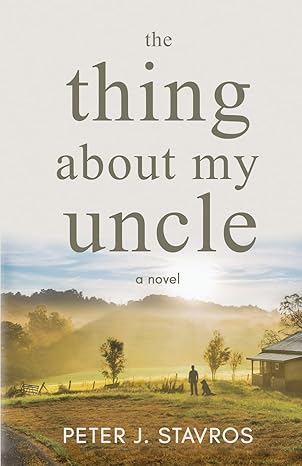3.5 Stars
This is an enjoyable coming-of-age story.
Fourteen-year-old Rhett Littlefield is expelled from his school in Louisville, Kentucky. His mother, totally frustrated with his behaviour, sends him to stay with her brother Theo. Uncle Theo is a reclusive, reserved man who lives alone, except for his dog Chekhov, on an isolated farm in Eastern Kentucky. Feeling he has no choice, Rhett agrees to his uncle’s strict home-schooling schedule, though he is given a mountain bike so he can go exploring on weekends. Rhett is determined to get to know his uncle, especially after they have some strange visitors. Gradually Rhett uncovers his uncle’s secrets, including some directly connected to his own past.
As I mentioned, this is a coming-of-age story. Rhett is trying to figure out where he belongs; because his mother works a lot, he has little supervision: “I had nothing to do, nowhere to be.” He is troubled by the absence of his father, a man who left the family about ten years earlier. Rhett feels guilty, believing he was somehow responsible for his father’s taking off and leaving his family. He admits that after a few years, “I gave up on waiting for Pops to come back, and I gave up on a lot of other things too, school being the primary other thing.” His being sent away by his mother feels like another abandonment. At Uncle Theo’s his life is structured and he has to pay attention to his studies. He is also encouraged not to waste time, to be active, and to have fun as well. As time passes, he realizes the truth of his uncle’s lessons, gains confidence, and becomes more secure in his self: “I guessed there was something to be said for not fitting in and still being comfortable in your own skin.”
Rhett is a young boy it is difficult not to like. He’s a good kid who has not had an easy home life. Though he does not always follow the rules, he’s not incorrigible. He’s lost and troubled. He’s sensitive, imaginative and, as his uncle repeats, “’you sure are an inquisitive one.’” He loves his mother and sister; he tries to understand his mother’s decision to send him away and concludes “it couldn’t have been easy for her, I knew it couldn’t, sending me off like this. And I felt that much worse for letting Mama down.”
Uncle Theo is also a character the reader will come to like. At first he’s just a big man with a disheveled appearance (wild hair, unkempt beard, torn clothing, tattoos) who is a mystery because Rhett knows little about him. As Rhett gets to know his uncle, we see a man who is not perfect but who is patient, spiritual, and wise. At times he made me think of Atticus Finch in To Kill a Mockingbird; just as Atticus talks to Scout and Jem so does Uncle Theo talk to Rhett and try to teach him about life: “’It’s not always so easy to tell the bad guys from the good guys. The line can get pretty blurry at times. That’s just how life is, bud’” and “’everything somehow works out the way it’s supposed to. Might not be the way you thought or hoped or had planned for yourself, could be something you never would have imagined in your wildest dreams’” and “’appreciate how precious time is.’”
Since Rhett is the first-person narrator, the style, with its repetitions, seems appropriate. Certain phrases are repeated throughout. For instance, when describing the dumpster near which Rhett gathers with his friends, he always mentions that it “smelled of sour milk”; when Theo rubs his beard, Rhett always mentions “the gray part around his mouth”; and when describing the quiet meals with his uncle, Rhett repeats, “just utensils clinking against plates, chews and swallows, Chekhov begging for table scraps.”
There are some nice touches of humour: Rhett’s first meeting with Chekhov, meals with mystery meat, and Rhett’s naive comments which are often ironic. But there is also tension, especially as strange men visit Uncle Theo and when the sheriff arrives with his warning.
There are a couple of things that bothered me: Rhett’s mother never calls to speak to her son? When Rhett learns something about his father, he doesn’t ask the most obvious question? Rhett is so innocent and naive that it takes him so long to figure out the nature of his uncle’s business? The discussion of religion feels forced and unnatural and the climax, inevitable and predictable.
The book is classified as adult fiction, but I think it would be appropriate for young adults. Teenagers would undoubtedly find Rhett a relatable character.
Note: I received an eARC from the publisher via NetGalley.

No comments:
Post a Comment